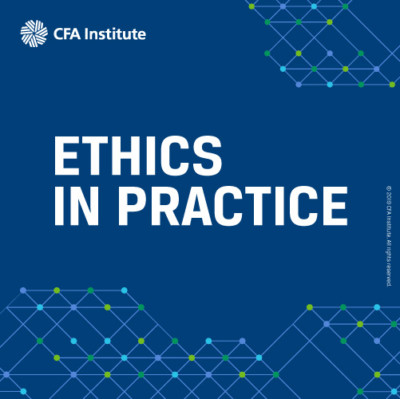Ethics in Practice: Mutual Fund Share Purchases. Case and Analysis–Week of 9 December
Analysis now posted!
Since October 2017, we have published over 100 Ethics in Practice cases. To mark the achievement, the Ethics in Practice series will be taking a break starting 20 December 2019. You can continue to exercise your ethical decision-making skills by using the Ethics in Practice Casebook, a compilation of 100 published cases and corresponding analyses from our Ethics in Practice series. Please stay tuned for new Ethics in Practice cases in the New Year.
Case
Avery is the founder and CEO of World Series Asset Management (WSAM), a firm that provides investment recommendations to its clients in retirement plans or charitable organizations. Avery advertises that WSAM selects the most economical share class for each client when purchasing mutual fund shares. Avery claims that WSAM uses a proprietary calculator for share class selection that is “designed to provide customers with the least costly share class option over the anticipated holding period of the investment.”
The calculator is designed to analyze client-specific data points, such as the client’s current mutual fund family holdings and planned future purchases as well as fund-specific information programmed into the system by WSAM personnel. But WSAM employees sometimes fail to code the share class calculator correctly, which leads to clients purchasing more expensive share classes when less expensive share classes are available. In addition, WSAM does not use the share class calculator for certain legacy retirement plan clients but attempts to find the lowest cost share class for these clients through detailed analysis of each individual account. Avery’s actions are
- acceptable because WSAM’s share class calculator identifies the lowest cost share class when used correctly.
- acceptable because WSAM provides a more thorough, personalized service when the share cost calculator is not used.
- acceptable as long as WSAM achieves the goal of identifying the lowest cost share class for each client, regardless of method used.
- acceptable as long as WSAM does not benefit by receiving greater compensation when more expensive share classes are identified for clients.
- none of the above.
Analysis
This case relates to misrepresentation of services. Avery and WSAM advertise that the company uses a proprietary share class selection calculator to achieve the goal of purchasing the most economical mutual fund share class for each client. But the calculator is sometimes used incorrectly, and for certain clients, it is not used at all. In addition, when coded incorrectly, the calculator does not recommend the most economical share class available. The fact that the calculator works when coded properly does not mitigate the fact that errors by WSAM employees render its claim misleading that the firm purchases the least costly shares for its clients.
For some clients, WSAM does determine and purchase the most economical share class but does not use the share class selection calculator as advertised and described to clients. Although the goal of purchasing economical share classes for clients is achieved through other methods, Avery and WSAM are still misleading clients by stating that the share class calculator is used when it is not. WSAM advertises its proprietary tool as an inducement to investors to hire WSAM and as a benefit to existing clients. Clients and potential clients are entitled to rely on WSAM’s description of its services when choosing an investment manager. When the process is materially changed without notification to clients or prospects, Avery is violating CFA Institute Standard I(C): Misrepresentation, which prohibits CFA Institute members from making any misrepresentations relating to investment recommendations or actions.
Even if WSAM does not benefit when more expensive share classes are purchased, clients are harmed because more expensive share classes can negatively impact the overall return of the investment. Because the claims of Avery and WSAM are misleading, Avery’s actions are unacceptable. Choice E is the best response.
Let us know what you think of Ethics in Practice by taking this short survey.
Have an idea for a case for us to feature? Send it to us at [email protected].
More About the Ethics in Practice Series
Just as you need to practice to become proficient at playing a musical instrument, public speaking, or playing a sport, practicing assessing and analyzing situations and making ethical decisions develops your ethical decision-making skills. The Ethics in Practice series gives you an opportunity to “exercise” your ethical decision-making skills. Each week, we post a short vignette, drawn from real-world circumstances, regulatory cases, and CFA Institute Professional Conduct investigations, along with possible responses/actions. We then encourage you to assess the case using the CFA Institute Ethical Decision-Making Framework and through the lens of the CFA Institute Code of Ethics and Standards of Professional Conduct.
Image Credit: ©CFA Institute


It seems to me that E is the correct answer. There is a violation at list at the point where calculator is not used for every client of the firm, which is not consistent with Standart III (B). I also think that Standarts III (A), V (A) and V (B) may be voilated as well, because it appears that not all clients circumstances are assessed properly. Just choosing the least costly shares may not be the best way for clients of the firm. Firm’s employees should find the best way for their clients needs to be satisfied, but not the cheapest one.
The correct answer is (E). WSAM employees failed to code the share class calculator correctly. In addition, the company provide customers with the least costly share class option, which may not be the best. WSAM did not use the share class calculator for certain legacy retirement plan clients. All clients should be treated the same. Bashar H. Malkawi